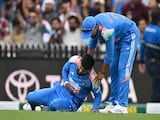People in the UK woke to a new dawn on Friday, with the Labour Party winning a landslide victory under its leader, Keir Starmer. The first Prime Minister of Indian origin, Rishi Sunak led his Conservative Party to its worst defeat in modern times. Its vote share fell to just 25.8% - worse than the previous lowest of 29.25% recorded by the Duke of Wellington in the 1832 election.
Although Sunak retained his own seat - Richmond and Northallerton in Yorkshire - about a dozen of his cabinet ministers lost theirs, including Penny Mordaunt, who was tipped as a future leader of the Conservative Party, and Defence Minister Grant Shapps. Some of the seats the party lost in Thursday's election had been Conservative for over a century.
The former prime minister, Liz Truss, whose unfunded tax cuts crashed the British economy in 2022 and forced her to resign in just 45 days in office, also lost. It was her resignation that had brought Sunak to power, seen in the Conservative Party then as the only person who could be trusted to fix the broken economy.
People Wanted Change
The main reason for the Conservatives' defeat was that people were crying for change after 14 years of rule. Although Sunak was able to immediately stabilise the economy, it was not an easy task to fix something that had been badly hit by Brexit, Covid, and the Russia-Ukraine war. It was during this time that India replaced Britain as the fifth-largest economy.
Sunak may have known a thing or two about business and economics, but he was never a popular politician. He lacked charisma and sound political judgment and was often accused of being a weak leader. Despite his promises and efforts, he could not improve the National Health Service and stop the small boats of illegal migrants reaching UK shores.
Although a former Brexiteer and right-of-centre politician, Sunak was regularly attacked by supporters of former Prime Minister Boris Johnson, who blamed him for his forced resignation. He also remained under fire during his time as prime minister from a group of ambitious right-wing fellow MPs, including Suella Braverman, another Indian-origin MP, who had been sacked by Sunak as Home Minister.
The Reform Juggernaut
But the most crucial factor that hit Sunak and his Conservative Party in this election was a right-wing party: Reform. Led by a firebrand veteran anti-immigration politician, Nigel Farage, Reform took sizable chunks of Conservative votes across the country, costing them at least a hundred seats. Farage himself got elected this time to parliament after seven failed attempts previously. Three other members of his party have also been elected.
It is a spectacular victory for Labour in Britain, a left-of-centre party. This is even more remarkable considering how much of Europe is tilting towards the far-right, with six countries in the continent having hard-right governments. Labour's victory is close to the one it achieved under the 43-year-old Tony Blair, when it won 418 seats with 43% of the vote. In this election, Labour under Starmer has won 412 seats with only 35% vote.
So, why is Labour's vote share in this election not that remarkable? Firstly, like Sunak, Starmer is also not a charismatic politician. Coming from a working-class background, he is a former human rights lawyer but not a popular person outside his own party. Many traditional Labour voters were angry with him for bringing the party to the centre and abandoning its socialist principles, and for his support for Israel. It lost a few seats to independents in sizable Muslim areas who successfully fought a pro-Palestinian campaign.
Some Labour supporters unhappy with Starmer's environment policy defected to the Greens, who won four seats in the parliament for the first time.
Jeremy Corbyn, the former leader of the Labour Party and a critic of India, won as an independent as he was expelled from Labour over his remarks about anti-Semitism.
How Indians Voted
A sizable number of Indians also voted against Labour and helped overturn a traditional Labour seat in Leicester in middle England in favour of the Conservatives. Shivani Raja's victory in Leicester East was one of the few good things in this election for Sunak's party. Bob Blackman, a vocal supporter of India in the British parliament, also retained his Harrow East seat by a big margin. It also indicated that at least some Indians have remained loyal to the Conservatives.
Although India got independence from Britain under a Labour government, in recent times, India's relations have been better under the Conservatives. Within the Labour Party, there is a strong pro-Pakistan lobby that tries to influence policy, though not very successfully. This has alienated many Indians.
But Keir Starmer is a pragmatic politician. As prime minister, he will try to retain good relations with India, though one would expect a Labour government to criticise India for its human rights violations and any unfair treatment of minorities.
One of Starmer's priorities will be to conclude a free trade agreement with India, on which the previous government already had done a lot of groundwork. Indian students, health workers, financial and computer experts play a key role in the British economy and the wider society. That is unlikely to change under the new government in Britain.
The Rocky Road Ahead
Like the Bharatiya Janata Party (BJP) in India, Conservatives have a formidable election machine. So, after a postmortem and some recriminations, the party is expected to reorganise, as it has done in the past. But the scale of defeat will take them much longer this time to fully recover.
Rishi Sunak is expected to resign from the party leadership, but he will stay a little longer until a new leader is elected. He has already promised to stay in parliament despite reports that he may return to the US to take a lucrative job in the corporate world. The election of a new leader will show where the party intends to head. The challenge of Nigel Farage's Reform Party will tempt the Conservatives to push to the right. But there are others in the party who will argue that it needs to get back to the centre if it wants to defeat Labour in the next election.
(Naresh Kaushik is a senior journalist and commentator based in London.)
Disclaimer: These are the personal opinions of the author















